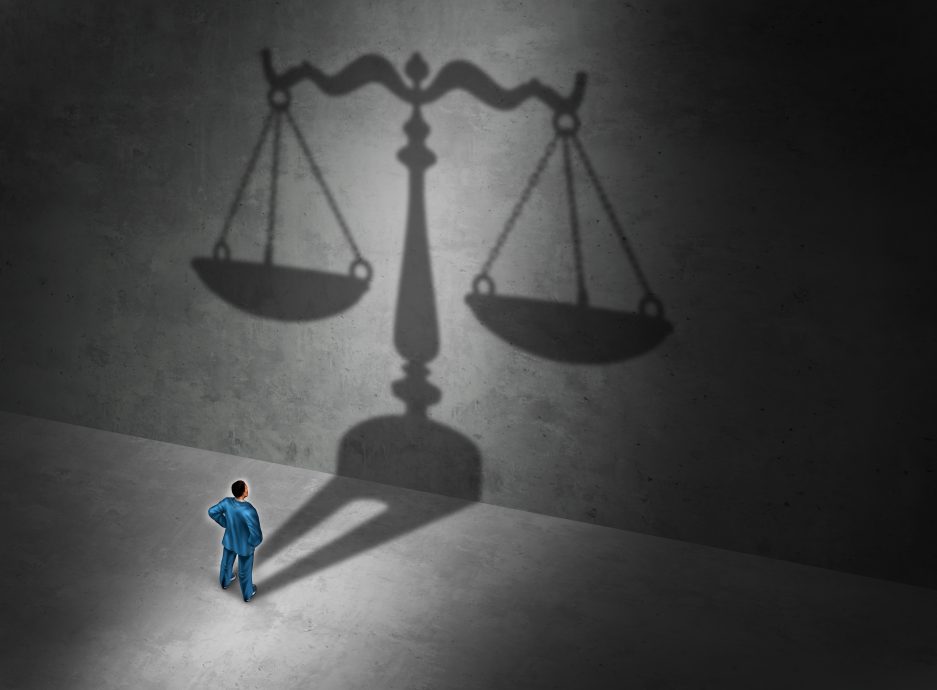Rather than focusing students on big common goals and helping them recognize their commonalities, DEI tears them apart.
Is “Loser Pays” a Vestige of Oppression? Part I
In response to a recent post on my blog, Misrule of Law, regarding the award of attorneys’ fees in litigation, a friend of mine scolded me for criticizing the so-called “American rule,” pursuant to which each side generally bears its own attorneys’ fees in lawsuits (subject to contractual or statutory cost-shifting). In my blog piece, entitled “One-Sided Loser Pays is the Worst of Both Worlds,” I remarked that “the entire legal system incentivizes litigation, and nowhere is this more apparent than the treatment of attorneys’ fees. The United States, practically alone in the world, does not follow the so-called English rule—loser pays. The ‘American rule’ [means]…that a defendant who incurs a fortune defending a meritless lawsuit has no recourse against the unsuccessful plaintiff.”
Critics of the American rule tend to view the filing of a lawsuit as a form of economic aggression: The plaintiff’s commencement of litigation—invoking the coercive powers of the state—undeniably alters the status quo by requiring the defendant to incur substantial legal expenses to defend himself. If the defendant does nothing, he loses by default and is subject to government-enforced execution of the resulting judgment. In addition to imposing enormous expense, litigation also subjects a defendant to significant intrusion (such as through pretrial discovery), inconvenience, and aggravation. Although sometimes necessary to enforce contracts and property rights, litigation itself is not a form of “private ordering,” such as consensual exchanges in a free market.
If the lawsuit turns out to be unmeritorious, and the defendant prevails, he is nonetheless saddled with large—and wholly unnecessary—legal bills. Surely justice imposes some obligation on the unsuccessful plaintiff to compensate the defendant for his financial injury, caused by the commencement of an unmeritorious lawsuit. Moreover, failing to penalize plaintiffs for bringing unmeritorious lawsuits incentivizes predatory litigation by rigging the cost-benefit analysis in favor of pursuing marginal claims. If the plaintiff wins, he gets a judgment or settlement; if he loses, he walks away scot-free. Without the risk of adverse consequences, the rational plaintiff will err in favor of pursuing weak claims. Discouraging frivolous litigation is sound public policy.
My friend, who is a conservative (albeit libertarian-leaning) lawyer, found my position objectionable. He strongly favors the American rule, and is opposed to the concept of “loser pays” (which is followed, not just in England, but in most of the western world outside the U.S.), because, he contends, it is a relic of a class-stratified era, and was used by the upper class to suppress claims by small land owners and others who could be destroyed by an unjust fee award. (Based on that logic, the same charge of inherent class bias could be made against the entire body of English common law.) “In this country,” he admonished, “we did things differently for a very good reason.” My friend suggested, perhaps facetiously, that criticism of the American rule borders on being “un-American.”
As a right-of-center commentator, I am used to criticism from the Left, but not often from fellow conservatives, and certainly not on the issue of civil justice reform—a topic that generally receives broad support across the conservative-libertarian spectrum. Had I overlooked something? I revisited my research on loser pays (which was admittedly 20 years old), and found that loser pays is still favored by a sizable flotilla of scholars and advocates, including Walter Olson (of Cato Institute), the Manhattan Institute, the Heritage Foundation, George Mason law professor David Bernstein, Ted Frank (currently of the Competitive Enterprise Institute), John Stossel, Reason magazine, the Texas Public Policy Foundation, Texans for Lawsuit Reform, former House Speaker Newt Gingrich (who made it part of the Contract With America in 1995), and even some liberals, such as Michael Kinsley and Steven Brill.
What was the source of my friend’s belief that loser pays is an archaic vestige of feudal oppression, properly rejected by the more-egalitarian American legal system at the founding of the republic? This thesis appears to be the Left’s narrative, espoused by some progressive historians and trotted out by the plaintiffs’ bar. The opponents of loser pays include the American Bar Association, ThinkProgress, the American Association for Justice, the Washington Post, and the New York Times, none of which is normally considered a bellwether of classical liberal thought. I cite these sources, pro and con, not to make an “appeal to authority,” but merely to delineate the nature of the dispute and the identity of the disputants. Let’s take a closer look at the issue.
Comparing legal rules across national borders can be difficult. There are many differences between England and the United States, aside from their treatment of attorneys’ fees in litigation. For one thing, England is more of a welfare state than is the U.S., with government-provided health care and other entitlements not generally available in America, including legal aid for indigents in civil cases. Britons are less litigious, and per capita have far fewer lawyers. Although American government and legal systems derive from a common Anglo-Saxon heritage, England has a much longer and more complicated history.
Despite their differences, however, America and England enjoy many similarities. Both are affluent, English-speaking western democracies governed by the rule of law. Yet, in comparison to England (or even Canada, our neighbor to the north), America’s legal system is extraordinarily costly. According to critics of the U.S. civil justice system, some of these greater costs are due to American innovations not present in England: contingent fee arrangements, class actions, jury trials in civil cases, pretrial depositions, and frequent awards of punitive damages.
What is the historical origin of the English rule, and why was it not adopted (or retained) in America? There is no pat answer to this question; the evolution of the rules, on both sides of the Atlantic, occurred over the course of many centuries, for complex reasons that defy simplistic characterization. Legal rules tend to be dynamic, not static. Moreover, societal attitudes toward lawyers have changed dramatically over time; “presentism” impedes our ability to understand past customs and beliefs.
Here is a capsule summary: Historians trace the beginning of “loser pays” in England to the Statute of Gloucester of 1278, which gave plaintiffs a right to claim certain “costs” (including attorneys’ fees) in specific real property suits. Over the next several hundred years, the rule was gradually extended to encompass other claims and to make recovery available to prevailing defendants as well as plaintiffs. In 1875, the award of attorneys’ fees to the prevailing party was made discretionary rather than automatic—and so it remains today. The English rule rests on the principle that the prevailing party has a right to be made whole for all legal expenses incurred as a result of an unsuccessful lawsuit—not only court costs but also attorneys’ fees.
In England, and in early colonial America (throughout much of the 18th century), attorneys’ fees were regulated by statute, primarily to limit the amount a lawyer could charge his client. (Lawyers were unpopular, then as now. Some colonies attempted to ban lawyers altogether.) Statutory regulation of fee recovery was just one aspect of a more comprehensive regulation of attorneys’ fees. The fees of lawyers, like those of a physician, were considered to be “honorary,” and payment by the client was considered to be a “mere gratuity” which a lawyer could not demand without harming his reputation. [1] A lawyer could not sue his client to compel the payment of his fee; courts could order the payment of attorneys’ fees only by a losing party to a prevailing party, pursuant to statute, as part of the recoverable costs.[2]
Colonial America followed the English rule well into the 1800s (admiralty cases were treated differently as early as 1796). [3] Under English law, distinctions were drawn between “advocates” and “solicitors,” various types of costs, and other arcane categories that were not germane to American practice. Gradually, these differences led American courts to deviate from English statutory and common law rules pertaining to attorneys’ fees.
Thus, the colonies initially adopted the English rule, but later went in a different direction. The shift away from the English rule did not coincide with the founding of the American republic, as my friend supposes, but with the rise of the legal profession and the development of a capitalist economy. The leading scholar on the development of the American rule is Rutgers law professor John Leubsdorf. According to Leubsdorf, American lawyers freed themselves from fee regulation in the early 19th century, and the move away from loser pays had nothing to do with concerns about the English rule deterring litigation by poor plaintiffs. [4] That explanation, Leubsdorf insists, is “a pure anachronism” because courts did not talk that way “before the twentieth century.” [5] Indeed, even the term “American rule” did not appear until the 20th century.
Part 2 of this post will delve further into the history of the American rule. Spoiler alert: The American rule emerged at about the same time as Alexis de Tocqueville’s visit to America, during which he noted that lawyers had formed a distinct “privileged body” comparable to England’s aristocracy. [6] As an aristocrat trained in the law, Tocqueville had a keen eye for such matters. The American rule does not reflect a rejection of feudal hierarchies, but the triumph of the legal class.
[1] Law v. Ewell, 15 F. Cas. 14 (D.C. Cir. 1817) (quoting attorney Roger Brooke Taney).
[2] 3 William Blackstone, Commentaries on the Laws of England 399-401 (1768).
[3] See Arcambel v. Wiseman, 3 U.S. (3 Dall.) 306 (1796).
[4] John Leubsdorf, “Toward a History of the American Rule on Attorney Fee Recovery,” 47 Law & Contemporary Problems 9, 10 (1984).
[5] Id.
[6] 1 Alexis de Tocqueville, Democracy in America (Vintage Classics 1990) at 273.



